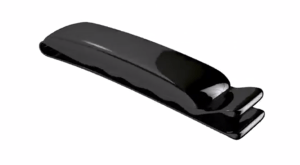Women facing imminent danger when walking down the street or getting into their cars will soon have new safety options in the booming wearables space.
Sense6, a five-member startup based in San Francisco, is unveiling jewelry pieces that sync to a user’s cellphone to alert authorities when the wearer encounters danger.
The device, which syncs via Bluetooth, simultaneously sends geolocation alerts to the phones of family members and loved ones at the touch of a button. Sense6’s smart jewelry also contains voice recorders that activate automatically and send the data in real time to the cloud.
“We want people to have the freedom to do what they want and to do it with a safety net,” chief executive Jeff Axup, who wrote his Ph.D. thesis on wearable technology, told VentureBeat. “Currently there’s not much out there on the market except smartphones. Right now, all you can really do is scream, run, go through your purse, pull out your cell, and call 911, which is too slow for most assault scenarios,” said Axup.
The wearables tech market is ripe for the picking. Analysts (here and here) predict the nascent space to reach $6 billion by 2016. Most wearables are currently geared to the medical, health, and fitness arenas (bracelets and watches that display vital signs when working out at the gym, for example). The personal wearable security market, analysts say, is a relatively uncharted niche.
Sense6 isn’t the only startup jumping in. First Sign, a bootstrapped three-member startup based in Scottsdale, Ariz., is in the advanced stages of unveiling a “smartpin,” or hairpin, geared initially for female users, that contains Bluetooth audio, video, and geolocation applications that sync to your smartphone.
First Sign’s smartpin also alerts authorities when the wearer encounters trouble.
If an assault does occur, data collected by the smartpin would be valuable to first responders, investigators, and ultimately, in the courtroom if a suspect is arrested, First Sign cofounder Arthur Emanuele said.
“The security oriented wearables market is a pretty new one. And First Sign is more than just a hairclip. The process of it goes well beyond the hardware. We believe we’re the first company to go after this,” Emaneule told VentureBeat, adding that you can preorder the device on crowdfunding site Indiegogo.
First Sign is looking to raise $2 million in a seed round. So far it has ducked the venture capitalists who got wind of the startup and started banging on First Sign’s door. But the company will announce two big-name investors shortly, he said.
“We compiled an investor deck first, we didn’t go to the VCs. We didn’t want to get diluted,” he said.
As for Sense6, it will begin beta testing its pendants and bracelets with women in San Francisco in two months.
Axup knows well the dangers unsuspecting victims face when walking down dark city sidewalks. He was beaten up and robbed twice on the very same street in Australia while traveling there. In both random attacks, all he was able to do was call the police on his cellphone while covered in blood.
Sense6 and First Sign aren’t the only two companies in the space. React Mobile, ICEdot and even the dinosaur in personal home security systems, ADT, have mobile security offerings. But Emanuele and Axup say those products relate primarily to cellphones and mobile security apps. Smartphones are one of the favored items taken by thugs during robberies.
Emanuele’s wife, Rachel, brainstormed the idea for First Sign while out jogging on isolated mountainous trails near the couples home in Arizona.
“I was thinking about what could happen to me,” she said.
First Sign plans to offer its smartpin in June.
Related articles
 Wearables at CES: The useful, the useless, and the downright bizarre
Wearables at CES: The useful, the useless, and the downright bizarre Wearable shipments will hit 130M by 2018, but are not yet a ‘must-have’
Wearable shipments will hit 130M by 2018, but are not yet a ‘must-have’ Bluetooth Smart jewelry is the next fusion of fashion and tech
Bluetooth Smart jewelry is the next fusion of fashion and tech 5 things we’ve learned about the future of wearables from Samsung’s Galaxy Gear
5 things we’ve learned about the future of wearables from Samsung’s Galaxy Gear 10 top wearable technology design principles
10 top wearable technology design principles



![Reblog this post [with Zemanta]](http://img.zemanta.com/reblog_e.png?x-id=828a0c7e-9230-4841-aa2c-fb2e64cfe2f7)

